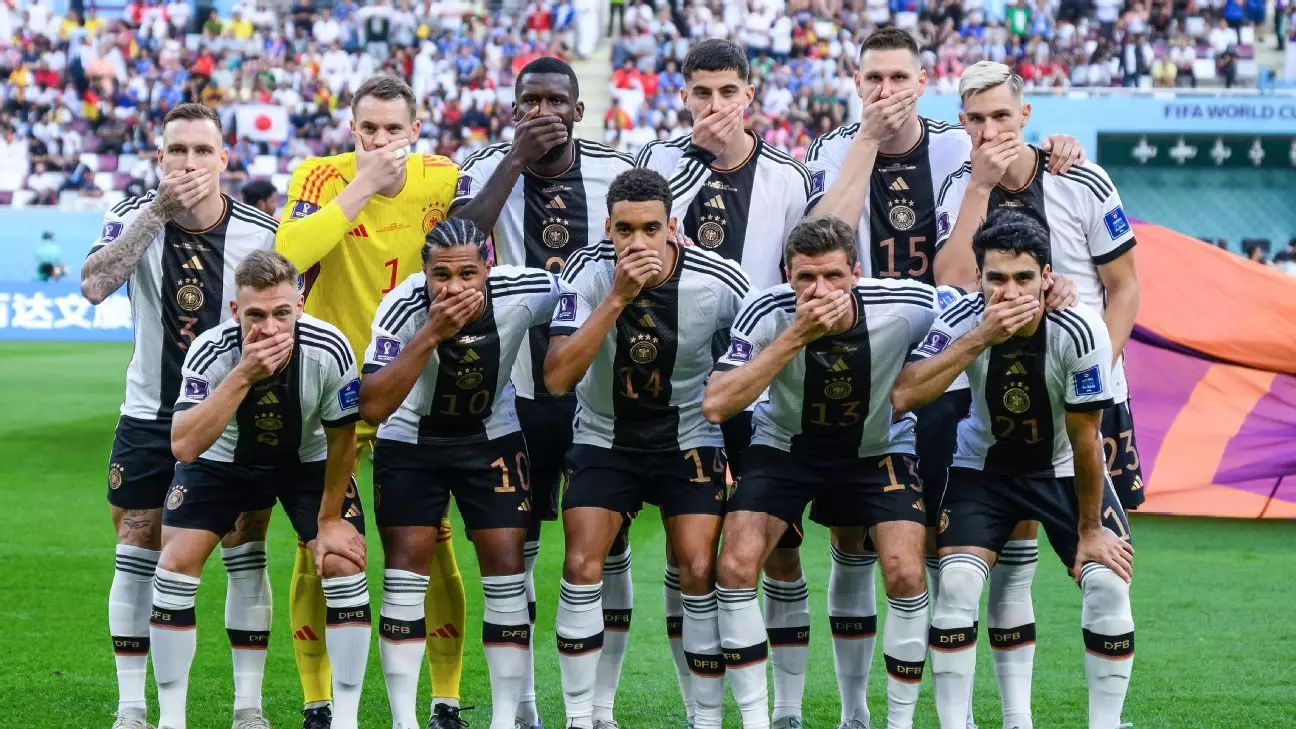In the ever-evolving discourse surrounding sports and society, the expectations placed on athletes have surged considerably. Not just seen as competitors, players are increasingly viewed as role models whose opinions can shape public sentiment and societal values. This discussion intensifies when political issues intersect with sports, exemplified by recent comments from Joshua Kimmich, the newly appointed captain of the German national football team. With the impending vote for Saudi Arabia’s bid to host the 2034 World Cup, Kimmich provided a nuanced perspective on the intersection of sports and political advocacy.
Kimmich highlighted the responsibility athletes carry as representatives of their respective nations. While he firmly believes that sports figures should embody certain universal values, he simultaneously emphasized that players need not engage in political analysis or advocacy on every occasion. The pressure athletes feel to act as spokespersons for societal issues is significant, yet Kimmich asserts a pragmatic view: there are limits to what players should weigh in on, especially given that they are not trained political analysts.
This sentiment reflects a widespread dilemma within the sporting world. On one hand, fans and media expect athletes to take a stand on pressing issues. On the other hand, athletes may find themselves ill-equipped to navigate political landscapes that are complex and fraught with historical context. Kimmich’s assertion of recognizing one’s limitations could be a catalyst for encouraging athletes to engage meaningfully without overstretching their expertise or diluting their primary focus.
Kimmich drew from the experiences of the German national team during the 2022 World Cup in Qatar, presenting a sobering reflection on the consequences of intertwining politics with sports. The German team engaged in political commentary through symbolic gestures, such as covering their mouths during a team photo in protest against FIFA’s stance on the “OneLove” armband—an emblem of diversity that was met with threats of sanctions. Despite the intentions behind these gestures, Kimmich noted that the political undertones affected the team’s overall morale and representation.
This notion is critical for understanding the dividing line between advocacy and performance. Focusing on sporting excellence often becomes secondary when political agendas take center stage, leading to an environment where the competitive spirit can be overshadowed by controversy and distraction. Kimmich’s experience serves as a cautionary tale for athletes across all sports regarding the potential repercussions of their actions and statements.
A Reflection on Values and Societal Challenges
In processing the complexities of societal values, Kimmich poignantly remarked that while Western nations often project their ideals as universal truths, they simultaneously grapple with their own shortcomings. Germany, like many developed nations, faces its own set of challenges and issues. This duality highlights a form of hypocrisy that can hinder effective dialogue about ethics and human rights when athletes and their nations present themselves as paragons of virtue.
Those in the realm of sports must carefully navigate these nuances, ensuring they promote positive values while recognizing that they, too, are flawed. Rather than positioning themselves as infallible moral arbiters, athletes can advocate for change through humility, allowing for a more effective and collaborative approach to global issues.
As the upcoming vote approaches, the implications of Saudi Arabia’s bid create a backdrop for thoughtful discourse on human rights and sports. Kimmich’s resolution that future athletes should solely focus on competing at their best encapsulates the delicate balance they face. With organizations like Amnesty International openly disapproving of Saudi Arabia’s human rights track record, the stakes are high, not just for athletes, but for the integrity of sports itself.
The role of athletes in society is undeniably multifaceted. As they navigate their identities as competitors, role models, and at times, inadvertent political commentators, they must blend their passion for sport with a respectful understanding of broader societal issues. As Kimmich acknowledges, the responsibility to address political complexities should ideally fall into the hands of those trained to do so, permitting sports figures to focus on excellence in their crafts while occasionally using their platforms to elevate discussions that matter without taking on the burden of expertise in politics.
